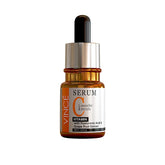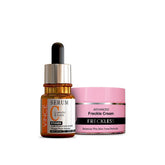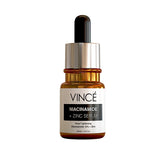7 Causes of Oily Skin on Forehead
If you are still wondering how to get rid of oily forehead and nose; no worries at all, we have got you covered.
Our bodies produce too much sebum in general, which ultimately results in oily skin. There are several reasons for excessive sebum production in the human body. Although sebum keeps your skin moisturized and protects it from various skin issues, excess of it may give you a greasy complexion and increase the risk of acne and blemishes.
Things to know about Oily Skin
Sebaceous glands in your skin overproduce sebum, an oily, waxy material that causes oily skin. Many people consider hormonal imbalance the main cause of acne, breakouts, and oily skin at the age of puberty or teenage. But oily skin does not only affect those in their teens and twenties; it can hit a person at any age and appear all of a sudden.
Even within hours of cleansing or washing your face, oily skin still gives a greasy texture. Additionally, sebum combines with dead skin cells and becomes trapped in open pores, increasing the chances of breakouts while making the skin more prone to acne.
There are several factors related to lifestyle, heredity, and environment that might contribute to oily skin and greasy foreheads in females. Although it is very hard to completely avoid oily skin, there are certain things you can do to reduce the oiliness on your skin.
It is very important to find the right balance between excessive oil production and preserving your skin's natural moisture level. This blog will help you understand how to prevent an oily forehead.
In order to reduce oiliness you need to use a good face wash that is gentle to your skin. A facial cleanser with harsh ingredients can irritate your skin and cause it to produce excess oil. Therefore, you need to invest in a gentle and moderate facial cleanser.

Causes of Oily Skin
If your skin feels oily all the time and gets shiny a few hours after being outdoors, you probably have oily skin. Just identifying the oily skin type is not enough, if you do not know the real cause of a greasy forehead male.
In order to control or prevent excessive oil on your skin, you need to figure out the potential causes of oily skin on your forehead so you can take care of your skin in the best possible way. Various unhealthy habits like heavy drinking, smoking, and eating junk can negatively affect the appearance of your skin.
We have listed the primary causes of oily skin below that can help you control the appearance of greasy skin on your face.
1. Stress and Anxiety
If you have oily skin, it may result from anxiety and stress. This is primarily because stress tends to trigger the release of cortisol, a stress hormone that can also increase sebum production by your skin and scalp. Therefore, it is crucial to take the necessary steps to control your anxiety, such as indulging in a relaxing bath or practicing meditation to alleviate stress.

2. Age
Throughout your life, the amount of sebum produced by your skin varies significantly. During puberty or teen years, sebum production rises to peak levels. And then it drastically declines after menopause for women and after 60 years of age for males.
Hence, it is true that your skin starts producing less sebum as you age. The functionality of sebaceous glands slows down with age, and the skin loses essential proteins like collagen. Numerous researches have indicated that 66-75% of individuals who are aged between 15-20 years reported having oily skin. These studies suggest that oily skin issues are more common among young adults.
3. Dehydrated Skin
Water is necessary for the healthy appearance of the skin. Insufficient water consumption might cause your skin to appear dry and dull. Furthermore, if your skin is not getting enough moisture or hydration, it will start producing excessive oil to compensate for the lack of moisture.
So, the best course of action is to consume an adequate amount of water every day. Decaffeinated herbal teas are considered the best substitute if you cannot drink much plain water.

4. Hormonal Changes
Your sebaceous glands may begin to overproduce oil as hormone levels fluctuate during the cycle, from estrogen and progesterone to testosterone, around two weeks before your period. Additionally, this alteration can clog the pores of your skin, which might lead to breakouts and severe acne.
5. Over Cleansing your face
We often scrub our skin too much. Generally, washing your face twice a day is preferable. You should also wash your face after exercise and refrain from using harsh cleansing or scrubbing. If you wash your face too often, it will strip off the skin’s natural oil and moisture. Consequently, your skin starts overproducing sebum because it has lost its natural oil which ultimately makes your skin oily.

What is an Oily T-zone?
Are you tired of dealing with breakouts and an afternoon glow on the greasy areas of your face? Do you find yourself asking every morning, "Why is my forehead suddenly so oily?" If you're experiencing this situation, you're not alone. Everyone has a T-zone, which refers to the skin covering the forehead, nose, and chin.

While most people with oily skin experience oiliness over their entire face, some may only have it in specific areas, such as the nose, chin, and forehead. These particular regions of your face contain large sebaceous glands.
The forehead, in particular, often feels and appears sticky and oily due to hyperactive sebaceous glands. The T-zone, with its heightened concentration of oil glands, is especially prone to oiliness. Shiny areas around your forehead, nose, and the middle of the chin are indicative of an excessively oily T-zone.
Important Link: How To Effectively Treat Oily Acne Prone Skin in UAE
How to manage an Oily T-zone?
It is not easy to deal with an oily T-zone. Sometimes it feels so embarrassing to have oily skin because oily skin seems so greasy and unclean. However, there is good news for people who have an oily T-zone. You can get rid of oily forehead acne by using the right products and implementing the right techniques.
Your forehead, nose, and chin are more vulnerable to acne and excessive oil production. Fortunately, you can maintain control over your T-zone with a few easy skincare steps. You can manage oily T-zone by using high-quality skincare products specially formulated for oily and combination skin types.
Let’s explore some helpful techniques that can help in managing oily and acne-prone T-zone.
1. Cleanse your face regularly
Firstly, cleansing should be an essential part of your routine, whether you have an oily t-zone or any other type of skin. You need to wash your face twice a day or more often if possible.
Cleansing your face thoroughly can help remove excess sebum along with germs, grime, and dead skin cells. Always use a gentle cleanser for washing your face such as Vince Detoxifying Neem Active face wash by Vince Beauty which helps detoxify the skin and makes it squeaky clean.

2. Moisturize the Skin
If you do not moisturize your face regularly, your skin may start producing more oil. As the final step in your skincare routine, you need to use a moisturizer formulated for oily skin, in the morning and evening both.
You should use water-based or oil-free moisturizers, facial serums, and cosmetic products. These products are specifically designed to moisturize your skin without aggravating oiliness or clogging pores.
3. Baking Soda
You can eliminate oily T-zone by using baking soda. It is an oily forehead home remedy. Make a mixture of water and baking soda and use it as a DIY face mask. After gently scrubbing the face, leave it for a few more minutes. Then wash your face after a few minutes, and you will see minimum oil on the face, especially in the T-zone with soft blackheads.
However, if you have sensitive skin then do not go for this remedy as it can cause damage to your skin. Don’t forget to do a patch test before applying it to the face.
4. Blotting Papers
You need to keep blotting papers on your hands if you want to get rid of oily T-zone. Even with a strict skincare routine, you might discover that your chin, forehead, and nose still seem shiny. Blotting sheets work wonders in such a condition; consider them your portable solution for greasy noses and chins.
Blotting sheets help in absorbing excess surface oil to reduce the appearance of undesired shine. Additionally, some blotting papers also contain powder that helps the skin appear more matte.
Important Link: Ultimate Guide for Oily Skin in Dubai's Summer
Final Thought
The T zone tends to produce more sebum because it has a larger density of sebaceous glands than other areas of the face. The T zone appears oilier than the rest of the facial skin due to this excessive oil production.
Although there is not a magic treatment for an oily T-zone; there are certain skincare steps you can do to reduce the amount of excess oil. The main goal is to balance the oil production in the T-zone while avoiding excessive oil removal that might harm your skin.
Frequently Asked Questions (FAQs)
Q1. How do I stop my forehead from getting oily?
Several things contribute to controlling oil on the forehead. Intake of a healthy diet, stress management, and oil control home remedies can stop the forehead from getting oily. However, opting for a proper skincare routine that is suitable for oily skin can work wonders.
Q2. What is the root cause of oily skin?
Oily skin can be caused by multiple factors. An unhealthy routine, intake of junk food, stress and anxiety, and use of the wrong skincare products can cause oily skin. To control oily skin, make sure to opt for a decent skincare routine that is recommended for oily skin.
Q3. Does stress cause an oily forehead?
Yes, stress triggers the release of cortisol, known as the stress hormone, which increases sebum production by the skin's sebaceous glands. This heightened sebum production can result in an oily forehead. However, Managing stress through activities like meditation and deep breathing can help reduce the impact on skin oiliness.
Q4. What hormone causes oily skin?
Androgen and testosterone are the hormones which are mostly responsible for excessive oil on the skin. The minor hormonal change or imbalance can cause increased sebum production. It usually happens during teen years or puberty and just before menstruation during menopause.
Q5. Why is my forehead so oily?
An oily forehead is mainly caused by overproduction of sebum (oil). Other factors like genetics, hormonal fluctuations, stress, wrong use, or overuse of skin care products that are harsh to your skin can also cause your forehead to get oily. Not moisturizing your face and open pores are also the causes of an oily forehead.

 KSA
KSA












